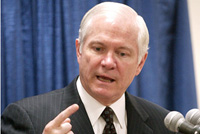Iran not to attend security conference in Bahrain

A regional Mideast conference will not be attended by Iran – as the nation decided not to participate in the last moment. The U.S. defense secretary is scheduled to deliver the keynote address, organizers said.
The decision was a sign of continued hostility between the two powers despite recent U.S. claims that Iran does not have an active nuclear weapons program.
Iranian Foreign Minister Manouchehr Mottaki had been scheduled to attend the conference, which opens Friday night, but the Iranians changed their mind and sent no one to the gathering in Bahrain's capital.
The conference, organized by the London-based International Institute for Strategic Studies, welcomed delegates from Persian Gulf nations, major powers, the United States, China and Russia, and other countries, such as France, Britain and Australia. Those here for the three-day event included foreign affairs and national security officials, and also analysts and private sector representatives from the countries.
The organizers were "notified at 10 a.m. (0700 GMT) that Minister Mottaki would not attend the Manama Dialogue and Iran would not send a delegation," said Kay Floyd, the conference's press officer.
There was no immediate report in Iran on the changed stance, but earlier Friday, Iranian state radio had said that an Iranian representative would attend the Manama meeting - an indication Tehran had likely made the decision at the last moment.
A diplomat at the Iranian Embassy in Bahrain, who spoke on condition of anonymity because he was not authorized to talk to the press, confirmed Tehran would not be sending anyone to the event.
U.S. Defense Secretary Robert Gates is scheduled to address the conference Saturday in a speech titled "The U.S. and the Regional Balance of Power."
Gates' speech comes as Washington is trying to keep up international pressure on Iran despite a recent U.S. intelligence report saying Tehran suspended its nuclear weapons program in 2003 and has shown no sign of resuming it.
The report was a dramatic turnaround from one issued in 2005 that concluded Iran had restarted its nuclear weapons program, but U.S. President George W. Bush has continued to push for a third round of U.N. sanctions against Tehran, saying international pressure is key to keeping the program dormant.
The report also contained warnings about Iran's continued nuclear activity and said the country could produce enough enriched uranium to have a nuclear bomb by 2010-2015.
Shortly after the release of the report, Mottaki said the U.S. would face more failure in its standoff with Iran over the nuclear issue if the U.S. didn't alter its stance. Mottaki's spokesman, Mohammad Ali Hosseini, has said the report proved Washington's warnings over the danger of the Iranian nuclear program "are baseless and unreliable."
The U.S. and many of its allies accuse Iran of using its nuclear program as cover for weapons development, a claim Tehran denies.
Washington has pushed through two rounds of U.N. sanctions against Iran and demands the country suspend its uranium enrichment program, which can produce fuel for a nuclear reactor or fissile material for a bomb. Iran has continually refused, saying it has a right to pursue enrichment under the Nuclear Nonproliferation Treaty.
Subscribe to Pravda.Ru Telegram channel, Facebook, RSS!




